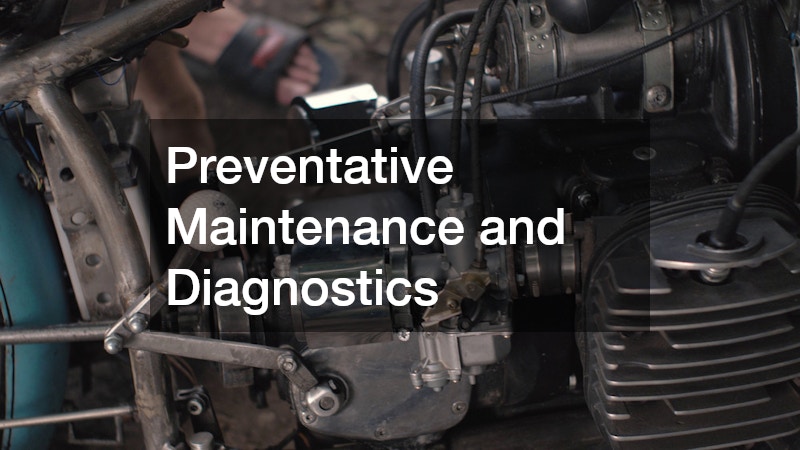Diesel engines play a pivotal role in numerous industries, from transportation to construction, offering durability and efficiency unmatched by their gasoline counterparts. These engines, however, come with their unique set of characteristics that need specialized maintenance practices from a professional diesel mechanic. Ensuring efficiency, longevity, and optimum performance mandates an appreciation and understanding of these unique requirements.
What Makes Diesel Engines Different from Gasoline Engines?
Diesel engines are built to withstand higher compression ratios than gasoline engines, resulting in robust designs that can handle increased stress. This fundamental structural difference imposes specific maintenance requirements, including more frequent inspections and the use of specialized tools designed for heavy-duty components. Consequently, understanding and appreciating these structural nuances is critical in tailoring maintenance procedures effectively.
The combustion process in diesel engines, characterized by higher temperatures and pressurization, is also markedly different from gasoline engines. This process can lead to different wear patterns and necessitates a keen focus on maintenance procedures involving the engine’s internal workings. Effective maintenance practices address the increased likelihood of carbon build-ups, ensuring the longevity and performance of the engine.
The diversity of materials and components used in diesel engines stems from the demands of high-stress and high-temperature environments. Diesel engines utilize advanced alloys and hardened materials to withstand operational stresses, yet these sophisticated components require fine-tuned maintenance approaches. Professionals must be familiar with the distinct maintenance practices these materials demand to avoid degradation.
What Are the Common Maintenance Needs for Diesel Engines?
Fuel System Maintenance
Maintaining the fuel system in diesel engines is critical due to the precision required in fuel delivery for efficient combustion. High-performance systems like fuel injectors need regular calibration and cleaning to ensure optimal spray patterns, which directly affect engine efficiency and output. Neglecting these tasks can lead to emissions problems and decreased fuel economy.
Furthermore, the fuel filters play a vital role in protecting the engine from impurities that can cause wear and damage over time. Regular replacement of these filters is essential to maintain system cleanliness and prevent particulate matter from affecting injector performance. Fuel system maintenance thus serves as a line of defense against long-term engine degradation.
Emissions Control Maintenance
Diesel engines are subject to stringent emissions regulations, requiring specialized systems to limit pollutants like nitrogen oxides and particulate matter. Regular maintenance of these systems is vital to staying compliant with environmental standards and ensuring optimal engine performance. Tasks include the inspection and repair of components like the Diesel Particulate Filter (DPF) and Exhaust Gas Recirculation (EGR) systems.
The complexity of the emissions control systems necessitates precise diagnostic tools and understanding to keep them functioning properly. Clogged or malfunctioning components can lead to increased emissions and potentially expensive fines or sanctions. Maintenance not only aids in compliance but also supports efficient engine operation and fuel economy.
Cooling System Upkeep
The cooling system plays a crucial role in managing the higher heat output typically experienced by diesel engines. Effective maintenance ensures that overheating, which can cause significant engine damage, is avoided. Regular checks and flushes of the coolant system can prevent the buildup of scale and rust, which impair performance.
Additionally, key components like the radiator, water pump, and thermostat require scrutiny to maintain the cooling system’s integrity. Deterioration in any of these areas can lead to catastrophic overheating failures, emphasizing the need for diligent maintenance practices. Professional expertise can efficiently address any anomalies discovered during routine checks.
Why Is Professional Diesel Engine Maintenance Recommended?
Expertise and Specialized Tools
Professional maintenance of diesel engines relies on the use of specialized tools and equipment designed for these robust machines. Expertise in the nuances of diesel technology aids in precise diagnostics and repair, ensuring each component operates to its full potential. Such professional interventions often prevent the escalation of minor issues into costly repairs or replacements.
Trained professionals understand the intricacies involved in diesel engines, from fuel system intricacies to emissions management. This expertise enables them to customize maintenance practices tailored specifically to address the unique needs of individual engines. Trusting specialists ensures that all maintenance work is performed with precision and care, fostering engine longevity.
Besides the assurance offered by skilled engineers, professional maintenance services are equipped with the necessary tools that facilitate efficient and thorough inspections. Ensuring every nook and cranny of the engine is thoroughly checked can only be achieved with the proper equipment. Investing in professional services is a definitive choice for safeguarding your diesel engine’s life.
Preventative Maintenance and Diagnostics
Preventive maintenance is a cornerstone of maintaining diesel engine health, emphasizing early diagnostics to forestall severe mechanical failures. By engaging professionals for regular checkups, potential risks are identified and addressed before they impact the engine’s performance. This proactive approach not only ensures peak functioning but can also save significant repair costs.
Scheduled diagnostics utilize advanced tools to evaluate engine health in a non-invasive manner, offering a transparent look into its operational status. Such diagnostics are invaluable for recognizing wear patterns, enabling timely interventions that avert progression to more critical issues. Adhering to a preventative maintenance schedule maximizes engine uptime and operational efficiency.
The specialized maintenance needs of diesel engines stem from their unique design, operational requirements, and distinctive componentry. Professional maintenance is indispensable, offering the nuanced expertise and specialized tools essential for navigating diesel engines’ complex landscapes. Embracing these practices ensures efficiency, extends engine lifespan, and secures optimal performance, making specialized maintenance an invaluable investment for all diesel engine stakeholders.
.

